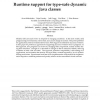Free Online Productivity Tools
i2Speak
i2Symbol
i2OCR
iTex2Img
iWeb2Print
iWeb2Shot
i2Type
iPdf2Split
iPdf2Merge
i2Bopomofo
i2Arabic
i2Style
i2Image
i2PDF
iLatex2Rtf
Sci2ools
127
click to vote
ECOOP
2000
Springer
2000
Springer
Runtime Support for Type-Safe Dynamic Java Classes
Modern software must evolve in response to changing conditions. In the most widely used programming environments, code is static and cannot change at runtime. This poses problems for applications, that have limited down-time. More support is needed for dynamic evolution. In this paper we present an approach for supporting dynamic evolution of Java programs. In this approach, Java programs can evolve by changing their components, namely classes, during their execution. Changes in a class lead to changes in the its instances, thereby allowing evolution of both code and state. The approach promotes compatibility with existing Java applications, and maintains the security and type safety controls imposed by Java’s dynamic linking mechanism. Experimental analyses of our implementation indicate that the implementation imposes a moderate performance penalty relative to the unmodified virtual machine. This work is supported by the Defense Advanced Research Project Agency (DARPA) and Rome L...
Defense Advanced Research Project Agency | Dynamic Evolution | ECOOP 2000 | Java Programs | Programming Languages |
Related Content
| Added | 02 Aug 2010 |
| Updated | 02 Aug 2010 |
| Type | Conference |
| Year | 2000 |
| Where | ECOOP |
| Authors | Scott Malabarba, Raju Pandey, Jeff Gragg, Earl T. Barr, J. Fritz Barnes |
Comments (0)

